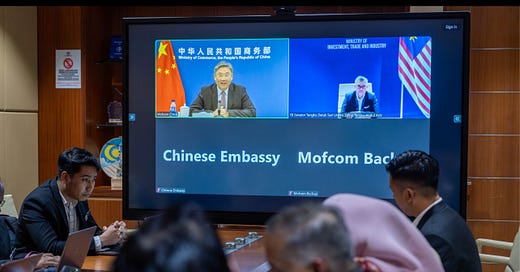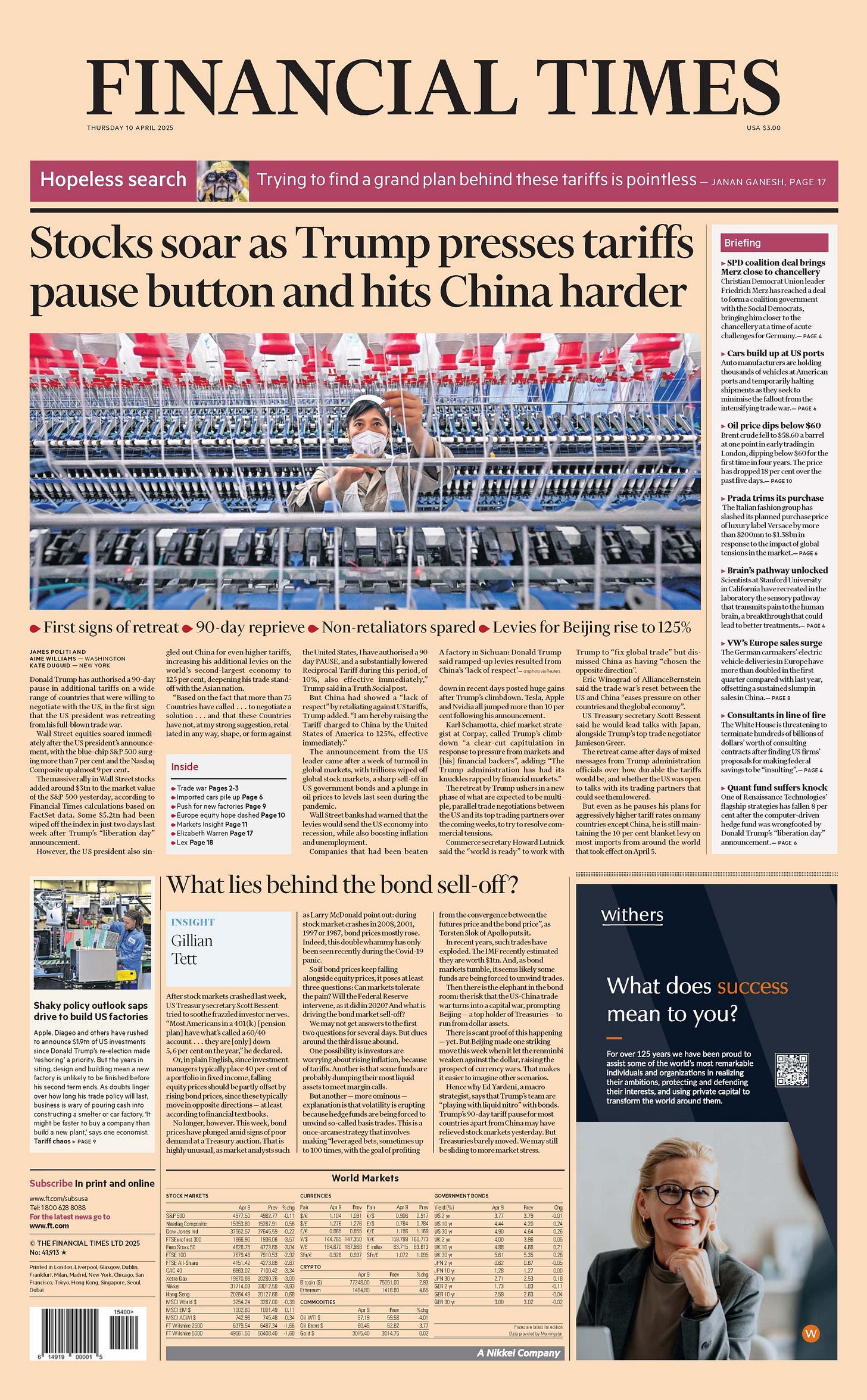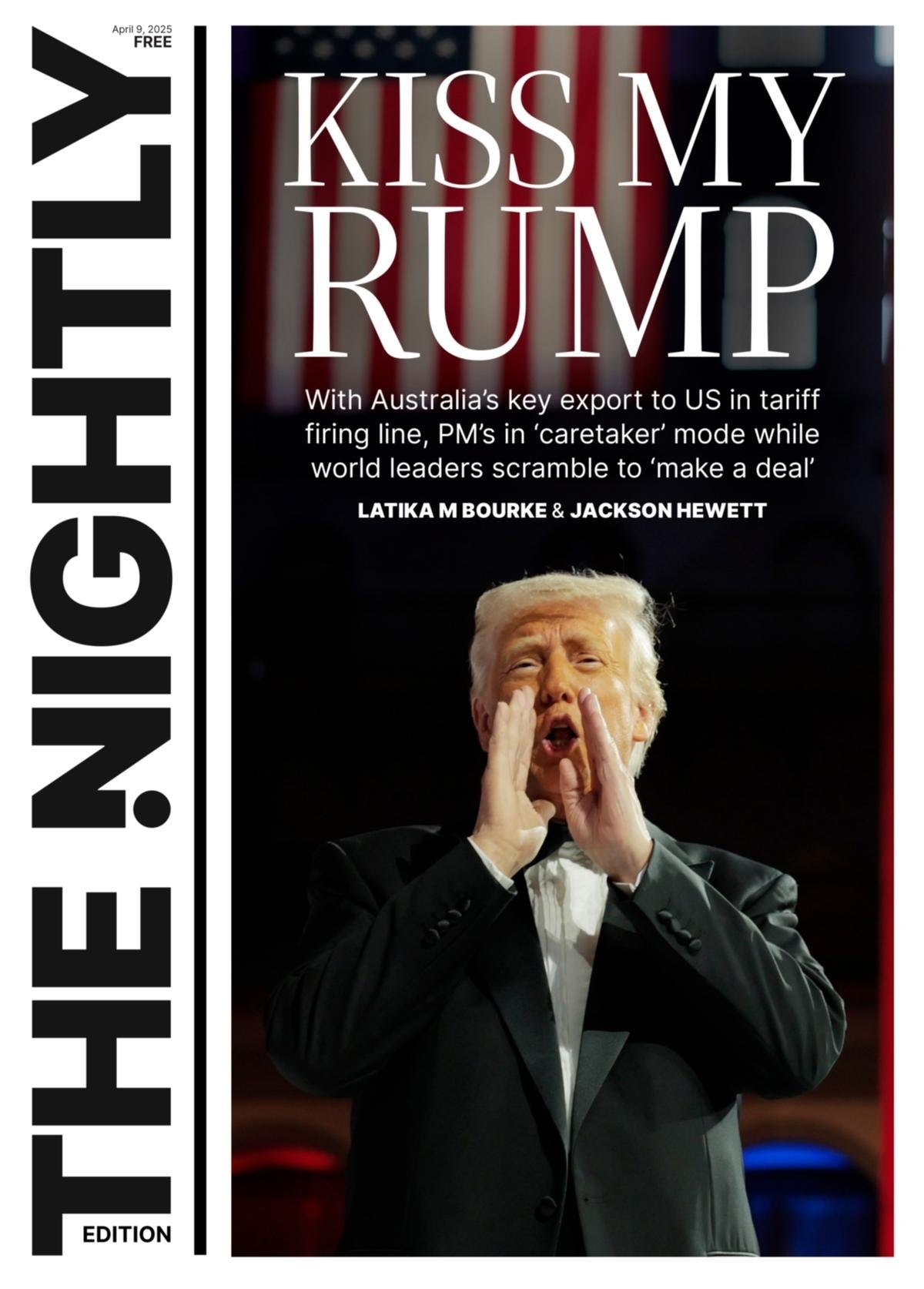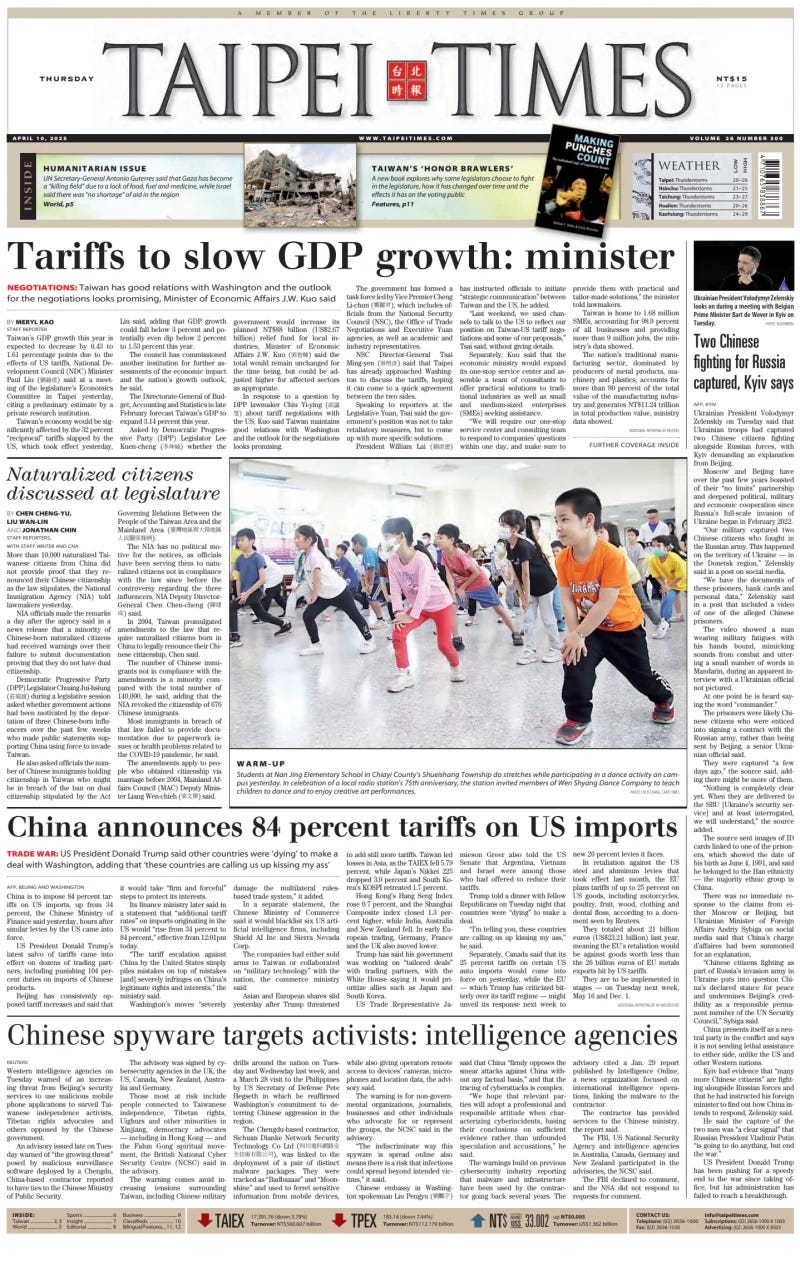Trump’s Whiplash Economics: A Reaction to ‘Yippy’ Voices?
Contortionist-in-Chief: Policy With More Twists Than a Yoga Class
Facing a global market meltdown, President Donald Trump on Wednesday abruptly backed off his tariffs on most nations for 90 days even as he further jacked up the tax rate on Chinese imports to 125%, the AP reported. It was seemingly an attempt to narrow what had been an unprecedented trade war between the U.S. and most of the world to a showdown between the U.S. and China. The S&P 500 stock index jumped 9.5% after the announcement, but the drama over Trump’s tariffs is far from over as the administration prepares to engage in country-by-country negotiations. In the meantime, countries subject to the pause will now be tariffed at 10%. The president hit pause in the face of intense pressure created by volatile financial markets that had been pushing Trump to reconsider his tariffs, even as some administration officials insisted the his reversal had always been the plan. As stocks and bonds sold off, voters were watching their retirement savings dwindle and businesses warned of worse than expected sales and rising prices, all a possible gut punch to a country that sent Trump back to the White House last year on the promise of combatting inflation. Despite growing pressure and a plunging stock market, President Donald Trump denied his change of tune was a capitulation to the business community amid a plunging stock market, but noted some of his advisers were “a little bit yippy.” He said: “I thought people were jumping a little bit out of line. They were getting a little bit yippy,” he said. “They were getting a little bit yippy, a little afraid.”
“Nothing is certain but uncertainty when it comes to Trump’s tariffs” - Malaysian Trade and Investment Minister Zafrul Aziz
Republican lawmakers may be expressing their relief at Trump’s U-turn on global tariffs—but it appears that none of them knew it was coming.
Trump’s congressional allies were publicly supporting Trump’s erratic tariff decisions as recently as 15 minutes before the president announced a 90-day “pause,” reducing the higher-rate “reciprocal” tariffs to 10 percent for almost all countries, except China. Most MAGA lawmakers learned the news like the rest of the public—through a Truth Social post, according to Politico. That post, according to Commerce Secretary Howard Lutnick, was only known to himself and Treasury Secretary Scott Bessent, who were in the room with the president as it happened. A conservative House Republican granted anonymity by Politico gave a more honest outlook: “What a sh--show.” - Daily Beast
Asian governments and business welcomed Donald Trump’s decision to slash his ‘reciprocal’ tariffs on most nations to 10% for 90 days but warned that even this level of duties, combined with the increased levy on China, will prolong uncertainty for firms and financial markets. Malaysian Trade and Investment Minister Zafrul Aziz, who was hosting a virtual meeting of economic ministers on Thursday morning to discuss the trade war said: “Nothing is certain but uncertainty when it comes to Trump’s tariffs.’ But he insisted that Malaysia would continue to push for “a coordinated regional response to the challenges.’ - Nikkei Asia
What we are witnessing this week is likely to be just the dawn of a profoundly different world. Companies including Apple, Dell, HP and Lenovo are scrambling to respond to America's unprecedented and unpredictable trade policies. Immediately after Trump announced his "reciprocal" tariffs, some suppliers were pressed to ramp up production and ship more smartphones, laptops and servers to the U.S. to beat the deadline for the levies. Finding a more lasting solution, however, is not straightforward, as the tariffs were slapped not only on China but basically all Asian countries, to varying degrees. “Many of our clients that previously chose Vietnam over the Philippines have come to us in the past few days, asking us to help package and ship products from our Philippines facilities, as the country faces only a 17% tariff," said a tech supplier executive who requested anonymity. Trump's policies could even end up fundamentally reshaping global trade flows. An electronics component supplier serving HP, Dell, and Apple said they used to look at the world as "China versus non-China." Since Trump's reciprocal tariffs, however, "we need to look at the world again, from a 'U.S. versus the rest of the world' point of view." - Nikkei Asia
International trade expert Aat Pisanwanich said the Thai government’s sluggish response to the US trade agenda leaves the country vulnerable to US tariffs and the wider impact of a global economic slowdown. He predicted disruptions in the supply chain and an influx of Chinese goods into Thailand. “Thai exports to the US and global markets could decline by 700 billion to 1 trillion baht ($20.5 billion to $29.2 billion) this year,” he cautioned. Economists urged Thailand to negotiate with the US to seek mutual benefits, while also exploring opportunities to strengthen domestic economic growth. Rather than relying heavily on exports to the US — which currently account for 18% of total exports — they recommended expanding trade with other countries, particularly through free trade agreements (FTAs). - The Nation
The escalating US-China trade war has made doing business with American buyers nearly impossible, regardless of how high the tariffs go, said Steve Chuang Tzu-hsiung, chairman of the Federation of Hong Kong Industries. Chuang described the US move as “highly irrational,” adding that the biggest challenge for exporters now is the uncertainty over whether goods produced in China can be shipped. “Buyers in the US are confused and don’t know how to respond,” he said. “Some are asking to cancel orders, while others want to delay shipments.” The 125 percent tariff hike has effectively made US-China trade unviable, and companies should no longer harbor illusions unless dialogue between the two countries resumes, a Hong Kong academic said. - HK Standard
A former Russian politician appointed by Vladimir Putin has been found guilty of sanctions breaches and money laundering by a London jury, in the first recent UK criminal prosecution for sanctions violations. Dmitrii Ovsiannikov, former governor of Sevastopol in Russian-annexed Crimea, was convicted at Southwark Crown Court on Wednesday of six counts of breaching sanctions and two counts of money laundering, according to the UK National Crime Agency. The jury was unable to reach a verdict on a seventh sanctions charge. His brother, Alexei Owsjanikow, was found guilty of two counts of sanctions circumvention and acquitted on three other charges. Ekaterina Ovsiannikova, Dmitrii’s wife, was acquitted of four charges of sanctions breaches. All three defendants are Russian nationals. The prosecution centred on Dmitrii’s status as a “designated person” on the UK’s sanctions list, which imposed certain financial prohibitions on him in relation to what funds could be made available for his use. Dmitrii and Alexei will be sentenced at a later date. The maximum sentence for circumventing sanctions is seven years imprisonment. The money laundering offences carry a maximum prison sentence of 14 years. Prosecutor said they would also pursue recovering the proceeds of the crime - FT
American shipyards will again be absent from a key annual summit for the global shipbuilding industry, in the latest sign that the United States is charting a lonely course as it strives to revive its maritime sector. Washington has sent shock waves across the industry in recent months with its aggressive policies targeting China’s dominant shipyards, which include plans to charge steep fees every time a Chinese-linked ship enters an American port. The US claims the policy is necessary to counter China’s unfair trading practices and allow American shipbuilders to compete, but the move has sparked intense backlash and market discussions about joint countermeasures - SCMP
France plans to recognise a Palestinian state within months and could make the move at a UN conference in New York in June on settling the Israeli-Palestinian conflict, President Emmanuel Macron said Wednesday. "We must move towards recognition, and we will do so in the coming months," Macron, who this week visited Egypt, told France 5 television. "Our aim is to chair this conference with Saudi Arabia in June, where we could finalise this movement of mutual recognition (of a Palestinian state) by several parties," he added. "I will do it (...) because I believe that at some point it will be right and because I also want to participate in a collective dynamic – which must also allow all those who defend Palestine to recognise Israel in turn, which many of them do not do," he added. Such recognition would allow France "to be clear in our fight against those who deny Israel's right to exist – which is the case with Iran – and to commit ourselves to collective security in the region," he added. Macron's comments were promptly welcomed by the Palestinian Authority, which hailed "a step in the right direction" - France 24
Rescue crews in the Dominican Republic on Thursday dug through the remains of a legendary nightclub whose roof collapsed earlier this week, killing at least 184 people, but hope of finding survivors was slim. Meanwhile, dozens of people in the capital of Santo Domingo still searched for their loved ones, growing frustrated upon getting no answers after visiting hospitals and the country's forensic institute. Doctors warned that some of the two dozen patients who remained hospitalized were still not in the clear, especially the eight who were in critical condition. Doctors said that injuries include fractures in the skull, femur and pelvis caused by slabs of cement falling on those attending a merengue concert at the Jet Set nightclub in Santo Domingo, where more than 200 were injured - Independent







